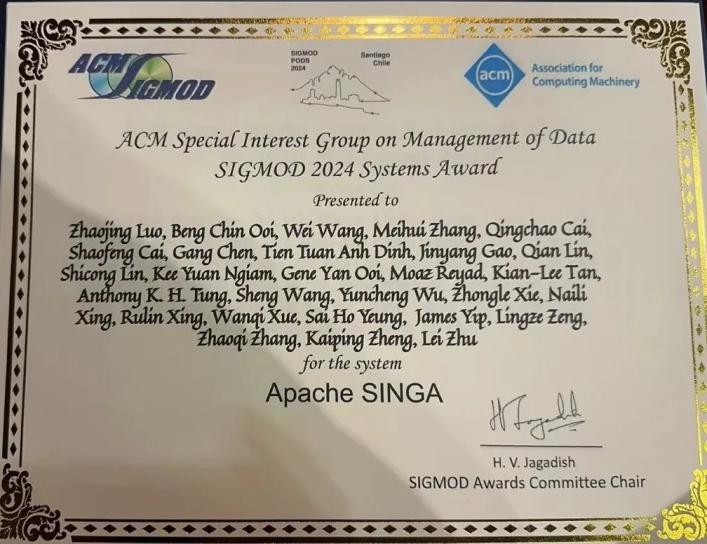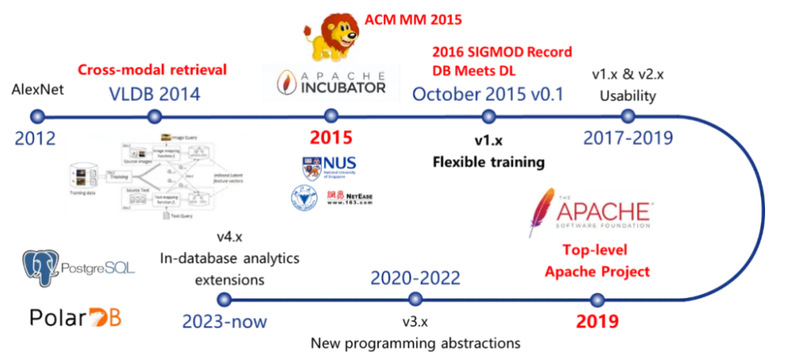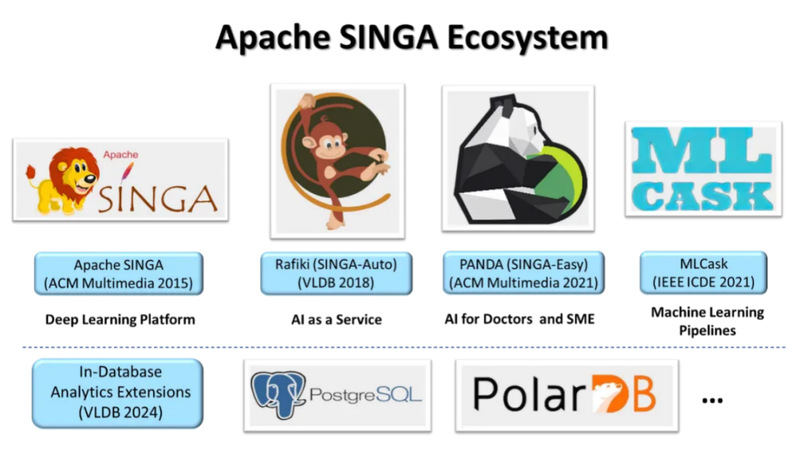
On June 12, 2024, the Association for Computing Machinery (ACM) announced that the ACM SIGMOD Systems Award 2024 would be presented to the distinguished research team led by Huang Mingjun, a foreign academician of the Chinese Academy of Sciences and Chair Professor at Zhejiang University's Qiushi Institute, and Professor Chen Gang, Vice President of Zhejiang University and Deputy Director of the State Key Laboratory of Blockchain and Data Security.
This prestigious recognition honors the development of Apache SINGA, a next-generation distributed deep learning platform created by Professor Chen Gang and Academician Huang Mingjun's team after years of research. Apache SINGA is ranked among the top 10 deep learning platforms worldwide for its exceptional performance and innovation, standing alongside industry leaders such as TensorFlow and PyTorch.
Introduction to the ACM SIGMOD Systems Award
The ACM SIGMOD Systems Award is a leading honor in the field of database management, recognizing individuals or organizations that have made outstanding technical contributions to the theory and practice of large-scale data management systems. Previous recipients include teams that have developed groundbreaking technologies such as Apache Flink, Apache Spark, and Postgres.
Further details about this year’s award can be found at [ACM SIGMOD 2024 Awards](https://sigmod.org/2024-sigmod-awards/). Key contributors from the State Key Laboratory of Blockchain and Data Security include Professor Chen Gang, the lab's Deputy Director, and researcher Xie Zhongle from the One Hundred Talents Program.
Introduction to Apache SINGA

Jointly developed in 2014 by Zhejiang University, the National University of Singapore, and NetEase, Apache SINGA was the first open-source deep learning platform incubated by the Apache Foundation. Between 2015 and 2016, Apache SINGA released versions v0.x, offering a flexible training framework for data and model partitioning and parameter synchronization, with optimizations for both synchronous and asynchronous SGD algorithms. The subsequent releases of versions v1.x and v2.x further enhanced system usability, introducing new programming models like tensor, device abstraction, Autograd, and ONNX.
Introduction to Apache SINGA

In 2019, In 2019, Apache SINGA was elevated to a top-level Apache Foundation open-source project, releasing version v3.x, which introduced distributed training capabilities. The development team also focused on creating a comprehensive software ecosystem for heterogeneous environments. They added extensible components such as the Rafiki module for training and predictive monitoring and MLCask middleware for managing machine learning pipelines.
Since 2023, Apache SINGA has been focused on extending in-database analytics capabilities for relational database management systems like PostgreSQL and PolarDB. The latest v4.x release introduced a model selection module that integrates seamlessly with RDBMS, supporting SQL-aware model slicing to enable more precise predictions for dynamic subsets of database records. The team remains committed to exploring the intersection of artificial intelligence and blockchain, aiming to drive technological integration and innovation.
Based on Apache SINGA's advanced technological platform, the team is advancing the intelligent optimization of blockchain systems to enhance performance and efficiency. They focus on developing efficient and trustworthy data preparation processes to ensure data accuracy and availability. Moreover, they prioritize data and model security to protect privacy and security throughout the data flow. Additionally, the team is exploring the potential of data markets to promote data circulation and value realization.
Today, Apache SINGA is widely applied across various industries, including smart healthcare, digital finance, the digital economy, and big data analytics. Notable users include NetEase, Alibaba Cloud, the affiliated hospital of the National University of Singapore, and Siemens. For more information, visit [Apache SINGA](https://singa.apache.org/).
Introduction to the AI x Blockchain project
During the development of Apache SINGA, the research and development team at the State Key Laboratory of Blockchain and Data Security has conducted in-depth studies in multiple directions involving AI and blockchain integration:
- Blockchain-Based Social Governance and Risk Prevention Technology (National Key Research and Development Plan): In response to the challenge of meeting the multiple objectives of high trust, real-time performance, precision, and intelligence in current social risk prevention and control systems, the team has proposed a new multi-technology integration framework based on intermediate state aggregation. This approach significantly reduces on-chain storage demands by aggregating massive risk data on the blockchain, bridging the performance gap between blockchain, big data, and AI technologies. The goal is to develop a blockchain-centered, multi-technology system for social governance and risk prevention, supported by a universal platform for practical applications.
- Distributed, Highly Trusted, and Highly Available Secure Storage System: To address the industry's requirements for high reliability, multi-mode functionality, robust privacy, and security when training large models, the team has designed a distributed secure storage system that integrates blockchain with federated learning technology. This system isolates privacy in the storage-training-inference processes, ensuring safe and efficient data sharing between data and computational power providers.
- ComputeMesh - The Next-Generation Trusted Data Collaborative ProcessingFramework: To overcome the challenges of limited trust and efficiency in decentralized big data management, the team has developed an intelligent big data technology system that deeply integrates blockchain technology. This system provides a common technical foundation for different scenarios, enabling the rapid construction of application systems and establishing a new paradigm for secure decentralized data processing. It supports trusted enhancements and near-real-time performance throughout the distributed data processing workflow.






